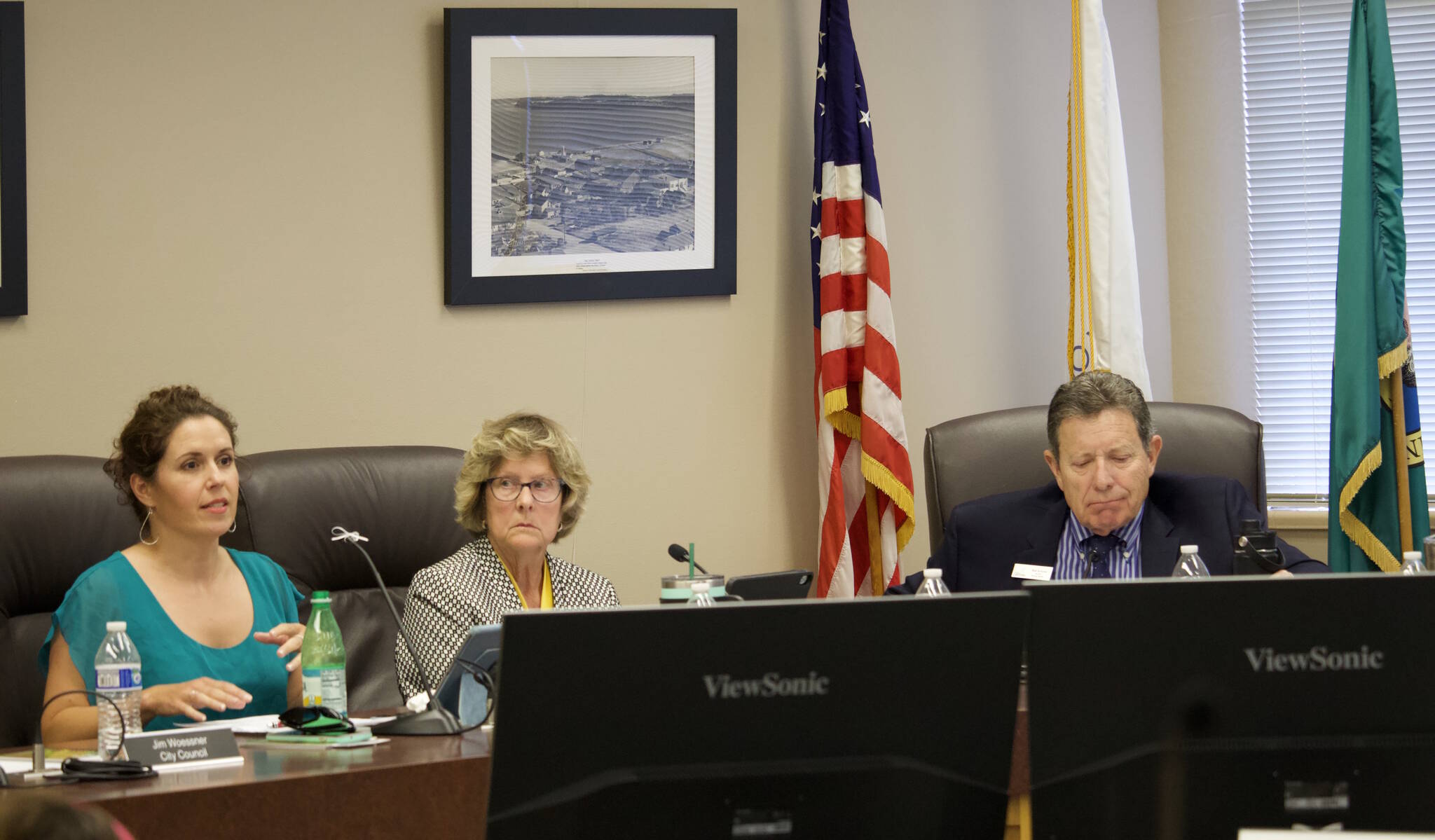The process of switching Oak Harbor’s mayor pro tem turned into a two-and-a-half hour rigmarole in council chambers Wednesday night.
Stripping Beth Munns, the longest-serving council member, of the position was meant as a sanction for her alleged threat — or warning — directed at two members of the city administration in June. But the lengthy discussion devolved into accusations and rebuttals which again laid bare hard feelings among city leaders.
“It is clear to the outsider there’s a huge division within the city and it breaks my heart,” Munns said.
On June 8, Munns was in City Administrator Blaine Oborn’s office and told him that he and Human Resources Director Emma House would be hit or slapped if they attended the memorial service of a city employee who died unexpectedly, according to a police investigation and Munns herself. Munns sent a letter to Oborn on June 22 in which she apologized for her choice of words.
Prior to the meeting, Oak Harbor Mayor Bob Severns alerted council members that, in response to the allegation, he was going to require Munns to alert him and the city attorney before communicating with city staff members.
On Wednesday, city council members reviewed the mayor pro tem position in response to the incident and, after some confusion, voted to replace Munns with Councilmember Tara Hizon.
During the citizen comment period, two former council members and the spouses of two elected leaders got into the fray.
Joel Servatius, who lost the election last fall, directed his criticism at Severns.
“What you and Blaine have done,” he said, “is taken a well-meaning conversation and disgustingly turned it into – for lack of a better word – a political spectacle to support your own selfish means.”
Servatius and another audience member claimed that the administration was censoring comments sent to the city.
After the comment period, Severns gave a statement in which he apologized to staff and the community for the “subject matter creating a distraction.” He said he appreciated Munns’ service to the city but that the recent incident is not the first time she acted inappropriately. He brought up a meeting he had in November with Munns and two other council members, whom he did not name. He said they demanded that he fire Oborn and the human resources director “without providing due cause.”
Severns described the vote of no confidence against Oborn that occurred in October as Munns’ second attempt to fire Oborn. That motion passed 4-0, with one abstention. Also, the mayor said he heard from former city employees that they felt “threatened by the mayor pro tem during conversations when she would appear at their desk unannounced and request them to share information they did not feel was appropriate.”
At Oborn’s request, both the police chief and a staff member in the human resources department investigated the incident. Both the city prosecutor and city attorney concluded that there was no criminal conduct. The chief’s investigation was released, but Munns said she may seek an injunction to prevent the city from releasing the HR investigation to the council and the public.
Munns stood at the podium to read a statement. She said an outside expert should have investigated the allegations and the fact that it was done by the human resources department was a “gross conflict of interest.”
Munns described the event, saying she asked Oborn if he and House were going to attend a city employee’s memorial service. When he said that he was, Munns said she suggested he reconsider due to “all the stuff that he and Emma had directed toward” the employee in the past years.
Munns said she was concerned that their presence would cause a scene and advised Oborn to sit in the back because she was “afraid that someone may come up to you and slap you. I’d hate to see that happen.” She said that she did not expect Oborn to misinterpret this comment as a threat or that the private conversation would be exposed to the mayor, city council and public to “fuel his retaliation against” her.
For the first time, Oborn spoke about the incident publicly. He said Munns’ comment was “clearly a threat” and a demand that he not attend the funeral.
After Munns spoke, Councilmember Shane Hoffmire made a motion to nominate Hizon as the new mayor pro tem. She has been on the council for 10 years and is the second-most senior council member.
Then things got confusing. Hoffmire, Hizon and Councimember Eric Marshall voted yes. Munns abstained from voting and Councilmembers Bryan Stucky, Dan Evans and Jim Woessner ultimately decided to abstain over confusion about the job description of the mayor pro tem.
According to the Revised Code of Washington, the mayor pro tem, in case of the absence of the mayor, will “perform any duties of mayor except that he or she shall not have the power to appoint or remove any officer or to veto any ordinance.” Additionally, the mayor pro tem has power to administer oaths and affirmations, take affidavits and certify them and can sign all conveyances made by the city and all instruments which require the seal of the city.
The motion was 3-0, with four abstentions. Severns ruled that the motion failed without four votes, but others questioned his interpretation of parliamentary procedure afterward.
In an unusual move, Stucky then made a motion to appoint both Woessner and Hizon.
Marshall was against taking another vote and abstained because the vote to appoint Hizon had just failed. According to Municipal Research and Service Center, the council should have first passed a motion to reconsider before again voting on whether to appoint Hizon.
Woessner and Evans voted to appoint Woessner, while Hizon won when she, Hoffmire, Stucky and Munns joined in the vote.



